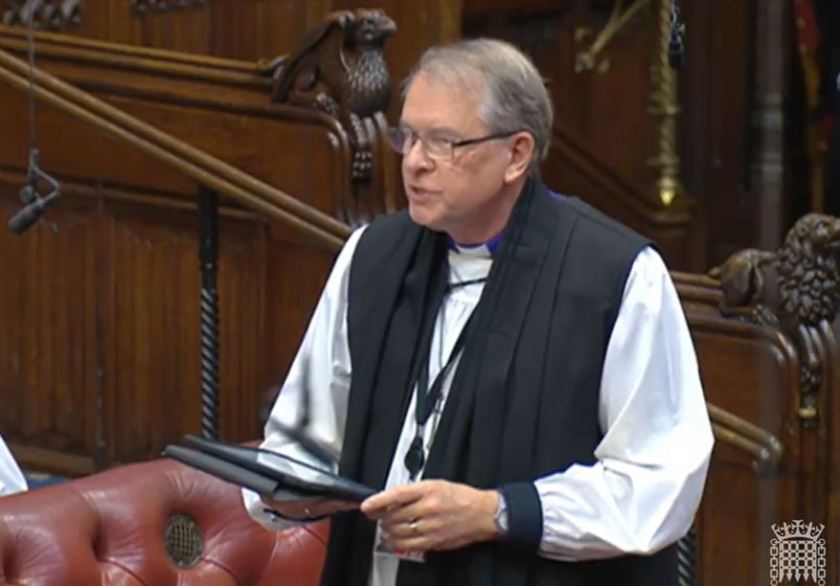On 10th May 2023, the House of Lords debated the Illegal Migration Bill in its first reading. The Bishop of Durham spoke in the debate, pointing out risks to child safeguarding and potential breaches of the refugee convention if the bill was enacted as written:
The Lord Bishop of Durham: I declare my interests as a member of the RAMP project and a trustee of Reset.
When looking to engage with a Bill, Members decide whether to focus on the detail or address the underlying principles behind the proposed legislation. This Bill leaves me with no choice but to start with the latter, as it asks fundamental questions about who we are as a nation. In order to supposedly reduce channel crossings, are we really prepared to consent to “extinguishing”, as the UNHCR puts it, the right to claim asylum and withholding support for victims of trafficking, and indefinitely detaining thousands of asylum seekers, including children and pregnant women? We have been left to consider the Bill’s provisions without an impact assessment, but these consequences will potentially lead to an unjustified intolerable level of harm which does not reflect who we are as a nation.
The Bill appears to be fundamentally about preventing those who have travelled irregularly to the UK from claiming refugee protection. This is in clear breach of the refugee convention and indiscriminately applies to everyone, regardless of the violence or persecution they may have fled. Let us be clear: this means even refusing to offer a child or a victim of trafficking the dignity of having their asylum case heard.
More than three-quarters of asylum cases assessed last year were found to be valid, but under the new regime they would be automatically deemed inadmissible. This Bill conversely gives up on the idea of returning home people who do not qualify for asylum by grouping them with those who would qualify and attempting to remove them to a third country. In reality, both groups will be left in a permanent state of legal precarity to face a future of inescapable destitution.
The Home Secretary’s duty to detain and remove asylum seekers changes the nature of detention considerably. It moves it away from an administrative process to facilitate someone’s removal to a wider system of confinement. Therefore, disturbingly, it does not discriminate. The state will view a child or a pregnant woman first and foremost as individuals subject to immigration control, not as an innocent child or a vulnerable mother due to give birth. We need to ask, “What about the Government’s duty to protect?”
Just less than a decade ago, the Conservatives introduced time limits for the use of child detention and, at the very least, I hope to see these limits back in the Bill for all children. A child faced with detention looks at their surroundings and asks, “What did I do wrong to be here?” This develops into the question “What is wrong with me?” We cannot let children face this trauma. As the Children’s Commissioner for England has said:
“It is not acceptable for them to be treated in the same way as adults”.
Safeguarding is not discretionary.
Although the Bill enacts a new system of detention, it does not set any standards, inspection details or protective obligations on the Home Office in terms of accommodation. As I have said before, children need the highest levels of safeguarding written into the letter of the law, and I hope that more detail will be forthcoming from the Government on this. I am reminded of Jesus’s words, that
“it would be better to have a millstone around the neck and be cast into the sea than to cause a little one to stumble.”
This responsibility needs to bear upon us heavily.
No one is questioning the need for compassionate measures to prevent asylum seekers having to resort to dangerous crossings to reach sanctuary. But the rationale behind proposing a cap on safe routes, while simultaneously penalising those who have no access to a safe alternative, is unjust. I do not want to see the UK abdicate its responsibility as a global leader to explore sustainable solutions to forced migration in solidarity with the persecuted. Undermining the global system of refugee protection is no solution, and it is beholden on us all to remember that no one is too different and therefore any less worthy of compassion and respect. I hope our language in debate reflects this truth.
The wonderful founder of Citizens UK, Neil Jameson, sadly passed away recently. He often shared this quote:
“It is not hope that gives rise to action, it is action that inspires hope”.
It is this action I have seen communities up and down the country take, as they have formed community resettlement groups, opened their homes to Ukrainian refugees and supported asylum seekers to build new lives and feel hope again. The British people support and help those who genuinely have need. Although there are strong feelings on the issues that this Bill raises, I pray as we work together to bring a range of amendments that the legislation will better reflect hope and a deeper humanity.


You must be logged in to post a comment.